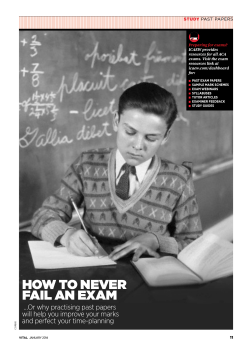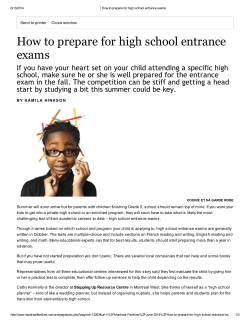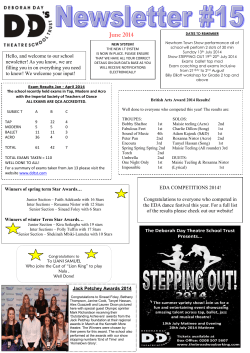
1077; email: ; hours 8-9:30 am, MWF, and by appointment... is the best way to contact me). If you can’t... CONTRACT WITH BREWER
CONTRACT WITH BREWER General Ecology - Biology 322 Instructor: Stephen Brewer, Professor of Biology (lecture and labs) Brewer's office/lab: 412 Shoemaker (office); 409 Shoemaker (lab); office phone 9151077; email: jbrewer@olemiss.edu; hours 8-9:30 am, MWF, and by appointment (email is the best way to contact me). If you can’t see me during these times, scheduled appointments are welcomed and strongly encouraged. See the lab syllabus for information about it and contact information for your TAs. Text (recommended): Ecology, M.L. Cain, W.D. Bowman, and S.D. Hacker, Sinauer. Learning Outcomes: An important goal of this course is to enhance students’ existing curiosity about and understanding of the natural world. After completing this course, you should understand and appreciate relationships between various organisms, including humans, and their environment. In addition, this course will provide a basis for objectively evaluating current issues, particularly those related to ecology, evolution, and human impacts on the environment (and vice versa). These outcomes will be achieved by evaluating performance on traditional exams and laboratory exercises and participation in a class debate. Instructions for students: All examinations will be based on material covered in lecture, from handouts, and from laboratory material. I will periodically assign reading from the text, but only to provide supportive material for the lecture. You will not be tested on any material from the text that I do not also cover in lecture. For this reason, the text is recommended but not required. Occasionally, material from the laboratory may appear on tests, but I will explicitly state which laboratory material you will need to study. You may be tested on material from handouts, regardless of whether I cover the material in lecture. Attendance and Participation: You are expected to attend class every session. The text (though helpful) is not an adequate substitute for the lecture, and I generally will not post lecture material on Blackboard. I will periodically take attendance, which could affect your grade. Also, your performance on the exams will almost certainly suffer if you do not regularly attend class. Class starts at 10:00 sharp. I give everyone 5 minutes at the beginning of the class to copy the outline for that day’s lecture. Lecture begins at 10:05. You should be seated and listening at that point, not just entering the classroom or still writing down the outline. Labs begin Tuesday and Wednesday January 28 and 29. Attendance in lab is required, and your TA will take attendance at every laboratory session. It is your responsibility to ensure that the TA knows you attended the lab. Assume your TA will mark you absent if you arrive after he has taken roll. Since most labs will be field trips, PLEASE BE ON TIME TO LAB. No make-up labs will be given. 1 Check your University email account or Blackboard every Monday morning for laboratory assignments. Electronic Device Policy: Your personal electronic devices have no place in the ecology classroom and are very distracting. You are not to use cell phones, smartphones, iPods, iPads or similar devices at anytime during class time or lab time. They must be silenced and stowed; no viewing of their screens is allowed. Laptop computers can be used for taking notes only (and not for internet searches) and are restricted to the first four rows of the classroom. Failure to observe these rules will negatively affect your participation grade. Requirements, exams, grades, etc.: The final grade is based on regular exams, a final exam, and a laboratory grade as follows: Exam 1 25% Exam 2 25% Exam 3 25% Final Exam 25% Laboratory 25% -----------------------125% - 25% (for lowest regular exam score) = 100% Grade Scale A = 89 - 100% B = 79 - 88.9% C = 69 - 78.9% D = 59 - 68.9% I have determined with scientific precision that 1% of my questions are screwy and should not be counted against you (hence, the reason for the 1% shift in the grading scale). This grade scale is fixed in stone. No curve will be applied to your final grade, nor will your final grade be re-scaled. All exams are multiple-choice and cover roughly equal amounts of material. The lowest score of the three regular exams will be dropped from consideration of the final grade. The final exam grade will not be dropped under any circumstances. The final exam is comprehensive, although it will emphasize material on which you have not already been tested (i.e., Community Ecology and Ecosystems; see below). Test Make-Up Policy – Test dates are decided in advance and will not be changed. Don’t count on being able to take exams whenever you please. Exams missed due to illness or other legitimate reasons will either be dropped or made up during the final exam period. If you choose to make up an exam, you must notify me ahead of time and be prepared to take it during the final examination after you have completed the final exam. 2 Those students who score 90% or better on the first two exams will be given the option of not taking and thus dropping the third exam. Schedule and Outline Recommended Text Reading Introduction What is Ecology? Ecology vs. Environmentalism Ecologists Use Experiments, Observations and Models to Answer Ecological Questions Unit 1 - Organisms and Their Environment The Physical Environment The Biosphere, Biomes, and Local Vegetation Patterns Vegetation Types of Mississippi How Do You “Measure” the Environment? External, Ecological, and Selective Environments Phenotypic Plasticity Acclimation Dormancy and Tolerance of Extremes Homeostasis and Circadian Rhythms Endothermy and Ectothermy Chapter 1 Chapter 2 Chapter 3 Not in Text Chapters 4,6 Chapters 4,7 Chapter 4 Exam 1 – Monday, February 10 Unit 2 - Populations What are Populations and Why Study Them? Population Growth and Regulation Exponential Population Growth and r Geometric Population Growth and Growth in Age-Structured Populations Density-Dependence Practical Application - Sustainable Yield of Fisheries Population Dynamics Demographic Stochasticity and Environmental Fluctuations Population Viability Analysis Metapopulations and Dispersal What is a Metapopulation? What is a Patch? What is the Classical Levins Metapopulation? What Influences Extinction and Colonization? The Conservation Significance of Metapopulations Landscape Ecology and Metapopulations Chapter 8 Chapter 9 Chapter 10 Chapter 23 P 502-514 Exam 2 – Wednesday, March 5 Unit 1 (Revisited) Evolution and Ecology What is Evolution? Mechanisms of Evolution Adaptation Parallelism and Convergent Evolution Speciation Sex and Breeding What Good are Males? Chapter 6 Chapter 7 3 Sex and Reduced Competition among Siblings Sex and Superfit Offspring Sex and the Red Queen Hypothesis Social and Altruistic Behavior in Animals What is Altruism or Why do Bees Die After They Sting You? What is Group Selection? What is Kin Selection? Life History Analyses Life History Trade Offs Why Delay Reproduction? Advantages of Early Reproduction Delaying Age at First Reproduction to Increase Reproductive Output Bet-Hedging: Iteroparity, Dormancy and Spreading the Risk of Reproductive Failure Why Die? The Evolution of Senescence Sexual Selection Not in Text Sexy Sons; Choosy Females Good Genes; Choosy Females Competitive Males Life-History Strategies: A Summary Chapter 7 r-K continuum Theory Exam 3 – Friday, April 4 Units 3 and 4 - Interactions Among Organisms and Communities What is a Community? Key Properties of Communities What is Species Diversity? Types of Biological Interactions Interspecific Competition and the Competitive Exclusion Principle Lotka-Volterra Predictions Limitations of the Competitive Exclusion Principle Equilibrium Hypotheses of Species Coexistence Disturbances and Diversity Succession and Alternative Stable States Biodiversity and Human Health: The Ecology of Disease - Can Prevention be a Cure? The Dilution Effect - A Case Study of Lyme Disease Unit 5 - Ecosystems What is an Ecosystem? Energy Flow and Food Webs Production The Global Carbon Cycle and Global Warming Forests as Sinks and Storage Pools Nutrient Regeneration in Terrestrial Ecosystems Fixation and Loss of N Phosphorus and soil pH Movement of Energy/Nutrients in Aquatic Ecosystems Energy/Nutrient Export from Coastal Marshes The Consequences of Species Diversity Chapter 15 Ch 11-14 Chapter 11 Chapter 18 Chapter 18 Chapter 18 Chapter 16 Chapter 13 Chapter 19 Chapter 20 Chapter 19 Chapter 24 Chapters 21,24 Chapter 18 Final Exam (Friday, 8:00 am, May 9, 1 hour, 15 minutes) – Comprehensive, but 90% of the questions will be on material covered since exam 3. Make-up exams will be given following the final exam. 4 I assume that all students have read the instructions listed above and are familiar with them by January 24. All students are responsible for following the instructions and procedures of this class. Enjoy the semester! Steve Brewer 5
© Copyright 2025





















